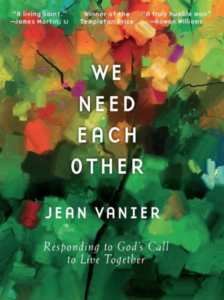This week’s blog post is excerpted from Jean Vanier’s “We Need Each Other.” This week get the Kindle version for just $1.99 on Amazon.
—
CHAPTER 2
The Cry of the Poor
Then the man and his wife heard the sound of the Lord God as he was walking in the garden in the cool of the day, and they hid from the Lord God among the trees of the garden.
But the Lord God called to the man, “Where are you?”
He answered, “I heard you in the garden, and I was afraid because I was naked; so I hid.”
(from Genesis 3)
I started L’Arche because I heard the cry of the poor. The cry of the poor is, “Do you see me as important? Am I of value?” The underlying cry of the poor is, “Do you love me?” At the very end of the Gospel of John, Jesus asks Peter the same question, “Do you love me?” By asking this, Jesus shows his vulnerability and his need for love. Jesus teaches us that he is one with the poor.
A few years ago, we welcomed Eric into our community. Eric has his own story, which began with a lot of pain. When his mother discovered the seriousness of his disability, she was devastated and heartbroken; she did not want a child like him! Both mother and Eric were wounded. His mother kept him at home until the age of four, but she did not know what to do with her little boy. Eric was not growing like other children his age, and he was also deaf and blind. At this tender age of four, his mother took him to the local hospital, where it was recommended that he be put into the regional psychiatric hospital. This is where we found Eric twelve years later. He was sixteen years old.
Eric was blind and deaf. He could not speak. He could not walk, and he had a severe intellectual disability. His mother had only come to see him once because she could not bear the lack of love and care that she saw in the hospital. I can say that I have never met a young person so vulnerable and with so much anguish. Eric was living with so much inner pain, yet within that pain lay a mystery.
Eric had not been baptized when he joined our community, but we still took him to the chapel. I remember him sitting in there, in his fragility, blindness, and deafness. There was a quietness about him, and his face was filled with peace. Did he know that he was in the chapel? He may not have known, but it seemed evident that God was present in him.
When Jesus announced the Last Judgment and told the people to come into his kingdom, he said: “When I was naked you clothed me.” The crowd responded, “But we never saw you.” Jesus continued, “When I was hungry you gave me food.” Again, the crowd responded, “But we never saw you.” It is clear that the entrance into the kingdom is through compassion, through clothing the naked, welcoming the foreigner, and visiting the prisoner; it is through welcoming the vulnerability of Eric.
Each one of us was born as a little child. This is an incredible reality in our forgotten histories. When a baby is born, the baby is vulnerable, easily wounded, fragile, and without any kind of defense. This child, held lovingly in the arms of the mother, learns through the tone of her voice, the tenderness of her touch, and her unfailing attention that he or she is loved. The child is not frightened of being vulnerable; he or she learns that it is okay to be weak and to have no defenses because he or she knows, I am loved. The message of the mother who says, in some way, “You are unique, I love you, you are precious, you are important,” is a source of joy for the child.
What happens if a child does not hear this? What happens if the child is caught up in a world of conflict, of hate, and of fear? Such is the vulnerable and broken heart of Eric. The anguish of Eric arose as he sensed that he was not wanted, that he was alone and unloved. We can understand his mother’s pain and the pain of parents who discover that their son or daughter has a severe disability. How will a mother in pain gradually discover that it is okay to be the mother of a child like this? To be the mother of Eric?
At the beginning of his life at L’Arche, Eric was incontinent, so one of the first things we did was to try and help him urinate in the toilet. One day he did! We all had champagne that day. People came in and asked what we were celebrating, and we said, “Today Eric has peed in the toilet!” Life is made up of little things. You do not have to do big things to celebrate together in joy. Every morning, one of us living with Eric would give him his bath. Even though he was sixteen, he was small. Bath time was a very precious moment. Through the touch involved in bathing Eric, we helped him to relax and to discover that he was loved.
Over the last few years, I have felt growing within me the recognition of the incredible vulnerability of Jesus, the wounded heart of Christ. The heart of Jesus is wounded because of his yearning to bring us together despite the fact that we are often resistant. The wounded heart of Eric and the wounded heart of Jesus are one. So what is L’Arche about? L’Arche exists to say to the Erics of the world, “I am glad you exist. I am happy to live with you.”

